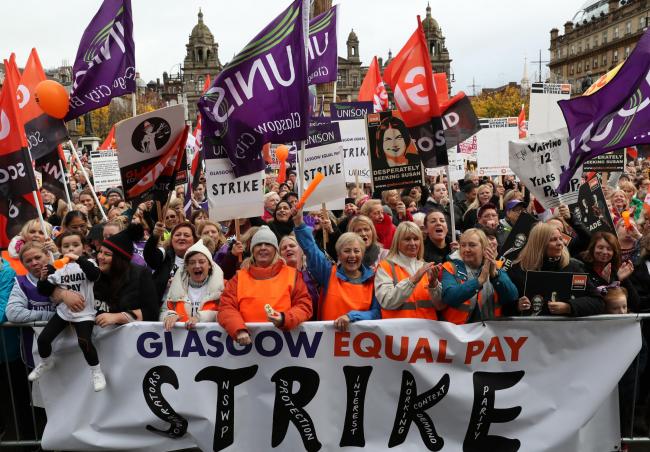Glasgow - Painfully Slow Progress

The Herald's editorial on Glasgow's historic equal pay strike concludes that the settlement process needs greater impetus.
If you ask me, that is polite language for saying:
'Get your finger out Glasgow City Council and deliver the serious negotiations that were promised months ago to end this dispute!'
https://www.heraldscotland.com/opinion/17003084.herald-view-equal-pay-process-needs-greater-impetus/
Herald View: Equal pay process needs greater impetus
Herald View

Strikers outside Glasgow Council's city chambers for a mass rally yesterday during a 48 hour strike by 8,000 GMB and Unison members over their equal pay claim.
IT takes a real sense of frustration for women providing vital – but low-paid – services to come out on strike. Sympathy for the caterers, carers and cleaners of Glasgow City Council in their struggle for equal pay is widespread, and persists even when the dispute is dogged by a perception that the women’s frustration is being manipulated for political ends.
Why there is a strike now, after the advent of an SNP administration trying to sort the problem, while there was none previously under Labour – when it was brushed under the carpet – is on the face of it difficult to understand. For many, the plot only thickens when they learn of close links between GMB officials and Labour.
Scottish Labour leader Richard Leonard’s expression of solidarity with the women yesterday brought forth a withering response from First Minister Nicola Sturgeonwho, normally measured in her language, expressed clearly angry “contempt” for Labour on the issue. The council’s SNP leader Susan Aitken, meanwhile, confessed bewilderment about the strike. Her administration, she said, had “grasped the nettle” of equal pay. Well, now she’s being stung by it.
Regardless of all the political shenanigans, the women’s frustration has been fuelled by the painfully slow progress made on the issue by the SNP administration. Ten months of talks and 21 meetings have led to little progress, which inevitably casts doubt about any sense of urgency surrounding the issue.
No one doubts the sincerity of women’s rights supporter Ms Aitken. And, doubtless it takes two to delay. Lawyers representing the women have made added – but reasonable – demands on matters such as pensions. A 30-strong team of council officials is on the case. And, while it might be unfair to assert that neither council officials nor lawyers have a reputation for haste, it is clear that stronger political will must be asserted to get this business sorted. As matters stand, the nettle is still standing.

Strikers outside Glasgow Council's city chambers for a mass rally yesterday during a 48 hour strike by 8,000 GMB and Unison members over their equal pay claim.
IT takes a real sense of frustration for women providing vital – but low-paid – services to come out on strike. Sympathy for the caterers, carers and cleaners of Glasgow City Council in their struggle for equal pay is widespread, and persists even when the dispute is dogged by a perception that the women’s frustration is being manipulated for political ends.
Why there is a strike now, after the advent of an SNP administration trying to sort the problem, while there was none previously under Labour – when it was brushed under the carpet – is on the face of it difficult to understand. For many, the plot only thickens when they learn of close links between GMB officials and Labour.
Scottish Labour leader Richard Leonard’s expression of solidarity with the women yesterday brought forth a withering response from First Minister Nicola Sturgeonwho, normally measured in her language, expressed clearly angry “contempt” for Labour on the issue. The council’s SNP leader Susan Aitken, meanwhile, confessed bewilderment about the strike. Her administration, she said, had “grasped the nettle” of equal pay. Well, now she’s being stung by it.
Regardless of all the political shenanigans, the women’s frustration has been fuelled by the painfully slow progress made on the issue by the SNP administration. Ten months of talks and 21 meetings have led to little progress, which inevitably casts doubt about any sense of urgency surrounding the issue.
No one doubts the sincerity of women’s rights supporter Ms Aitken. And, doubtless it takes two to delay. Lawyers representing the women have made added – but reasonable – demands on matters such as pensions. A 30-strong team of council officials is on the case. And, while it might be unfair to assert that neither council officials nor lawyers have a reputation for haste, it is clear that stronger political will must be asserted to get this business sorted. As matters stand, the nettle is still standing.

